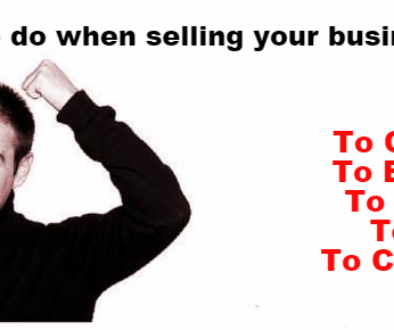A Buyer’s Litmus Test to Purchasing a Business
When preparing for any invasive procedure, you would want to first address the issues that are the most crucial when deciding if further exploratory examination is warranted.
Therefore, every person looking for a business to buy should ask key questions that will cut right to the chase in order to decide if a particular business warrants their further focus, time, and in-depth scrutiny.
When a buyer calls a business brokerage firm to inquire about a business for sale, these qualifying questions can serve as a litmus test before a buyer decides whether to commit more time on researching a specific business. This will save time for everyone involved — the Buyer, the Broker, and the Seller.
WHERE IS THE BUSINESS LOCATED?
Buyers usually want to know the name of the business, the location, and financial history when they first make an inquiry. In order to protect the confidentiality of the business, however, a buyer must first meet certain criteria just as much as a buyer expects the business to meet certain standards. It’s a two-way street, and it starts with the first contact.
Confidentiality is the most important issue when an owner is selling the business. Gaining access to private details about a business for sale is invasive, and potentially harmful. That is why it is important for a broker to receive information about a buyer up-front.
Prior to discussing confidential information about businesses for sale, business brokers require prospective buyers to complete certain forms that serve two purposes. They protect the interests of business owners during the sale process and enables a business broker to assist buyers in their acquisition search.
In short, before a buyer can expect to get private information about a business, a buyer must prove they are serious, agree to confidentiality, outline their financial capacity for a down payment and income requirements, and describe their relevant business experience.
You probably also want to ask them the size of the business: annual sales and earnings and how many people are employed. Ask what is included in the proposed sale (like real estate, equipment, the seller’s consulting and non-compete agreements). These aren’t all the details you need, but now you are ready to go to the next question.
WHAT’S THE OPPORTUNITY?
Ask why it’s a good deal. What opportunity does this business offer? What’s special about it? What position does it have in its market? What’s the ‘up-side’ potential?
Listen for information about what you are buying: customers, employees, market position and operating systems. These are the key elements of any business. If the seller or broker is willing to tell you the business ‘story’ in this first contact, listen for information in these categories.
HOW WAS THE PRICE DETERMINED?
Most sellers who have chosen to be a ‘FSBO’ (For Sale By Owner) will flub the question and reveal their pricing ignorance and negotiating secrets. Answers like, “well, the mortgage balance is . . .” may tell you that they are focusing on what they need and not what makes sense for you. Or, it may expose their real motive for selling, as in: “well, the mortgage balance is about $200,000 and we just want out!” Or, it may reveal pathological tendencies, as in: “well, the mortgage balance is about $200,000 and we have to recover our losses for the last ten years, so…”
Most brokers will handle this question much better than FSBOs. They will probably avoid explanations which would later commit them, or their seller clients, to any particular pricing rationale. They may even change the subject trying to find out what, besides price, motivates you.
You will probably base your buying decision and offer, like most buyers, upon your estimate of the potential profitability of the business after you own it. But it can occasionally make sense to pay more than what others consider ‘fair market value.’ Location, lifestyle and other strategic factors can make a business much more valuable in the eyes of some buyers. For obvious reasons, sellers and brokers prefer to work with this type of buyer.
If there are strategic issues that matter to you, you may, or may not, want to let the seller or broker know about it. On the other hand, without knowing your motives, brokers won’t be able to be creative in their response to your needs.
WHAT’S THE FINANCING?
Ask if the seller has given any thought to how the business can be financed by a buyer. How much money is the seller looking for as a down payment? Will the seller finance some of the purchase price? Is there another lender involved (like a bank or a former owner)? Is there an assumable loan?
This is an essential area of inquiry if you are trying to save time. Sellers and buyers alike, are unrealistic in the early stages of the business sellling and buying process. Sellers usually hope for an all-cash buyer and Buyers are often looking for 100% seller financing! In reality, the ‘average’ deal is closer to 30-50% down in cash from the buyer with 50-70% financing from sellers and/or banks.
It is very important to find out how much of your cash the seller and broker think is needed to buy and run the business. You will typically need cash for the down payment, closing costs and working capital.
Most sellers, when they start the selling process, don’t understand the needs of business buyers. So, if you are a buyer, whatever you say to a seller, be gentle and proceed slowly to avoid offense. The first contact sets the stage. Both are sizing eachother up and deciding if their is interest in further discussions. Keep the discussion general in this early stage.
At the same time, you must realize that you will probably need seller financing. Banks are not likely to lend to buyer prospects without specific and relevant business experience. This is true for most small businesses where the bank anticipates that the owner must also be the manager. Experienced buyers can get bank loans. Most first-time business buyers need seller financing. Sellers are much more likely to finance buyers they like, regardless of experience. But, it can take time for sellers to warm-up to this idea and to a particular buyer prospect.
WHY IS THE CURRENT OWNER SELLING?
Ask why the seller is selling only after you have a comfortable conversation going. Get as much of the seller’s or broker’s confidence as you can before you ask this question. It is critical for you to know this information. You want to get the answer that the seller and broker may otherwise be hesitant to tell a stranger.
Sellers have many motives for selling. Some are obvious. Some are not. It may take time to get to know a seller and his/her real motives for selling a business. It may be that the seller is sick of the management role, doesn’t really know how to grow the business any further, is ready for retirement, is moving for lifestyle reasons, or is physically ill. Or, it may appear to be one or more of these reasons, but actually may be that the seller has knowledge of pending new competition or some other change that will be damaging to the business.
If a seller has run the business for a very long time, then the motive for sale is probably the usual management fatigue or retirement which needn’t concern you. But, even if the seller’s motive seems clear, you will later need to take a closer look until you figure out what’s happening. A clue to the seller’s attitude about the future of the business is often the amount of seller financing being offered. If a seller is offering to help finance your purchase, there is probably no cause for alarm.
Most sellers will answer honestly if you are persistent. An experienced broker probably knows the real motives for the sale and will give you straight answers early-on. Sometimes, however, brokers don’t really understand a seller’s motives, especially in the early stages of a listing.
There may, in fact, be several reasons for the sale and you should know them all.
SEARCHING CAN TAKE MANY MONTHS
Business searches can take many months. Many buyer prospects endlessly spin their wheels in business searches that do not produce results. Many waste time pursuing the wrong candidates because they fail to ask these simple questions. They waste hours, weeks and even months meeting with sellers and brokers, researching markets and crunching numbers.
Usually, after answering whatever initial questions you ask, sellers and brokers will invite you to a meeting and/or offer to send you more information. Before you invest more time, however, be sure you have qualified the business. Does it interest you? Is it an opportunity worth pursuing? Can you afford it?
There are still many more questions to ask in order to be ready to make an offer. But, answers to these questions offer a good beginning litmus test before you commit more time to acquisition research on a specific target business.




